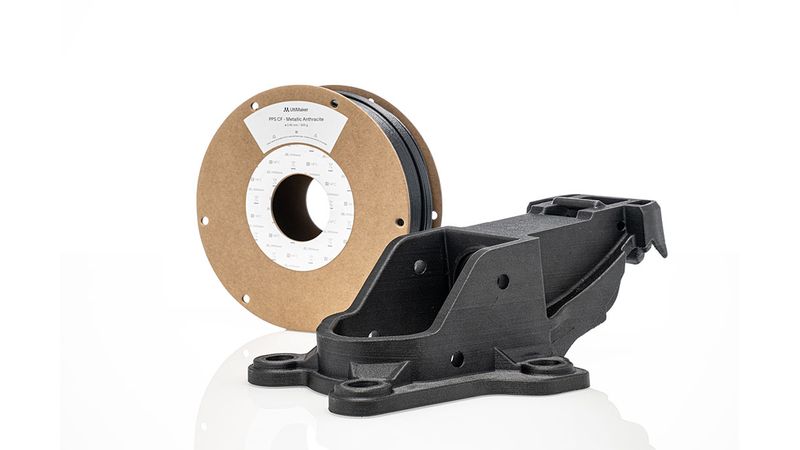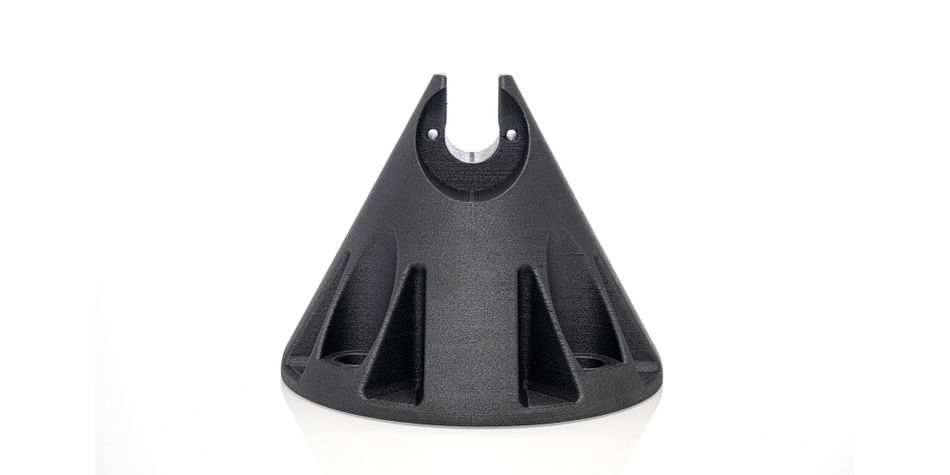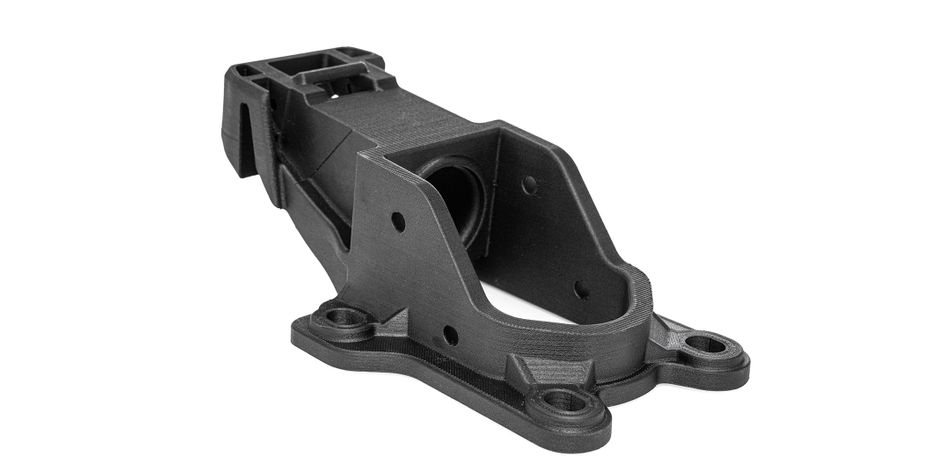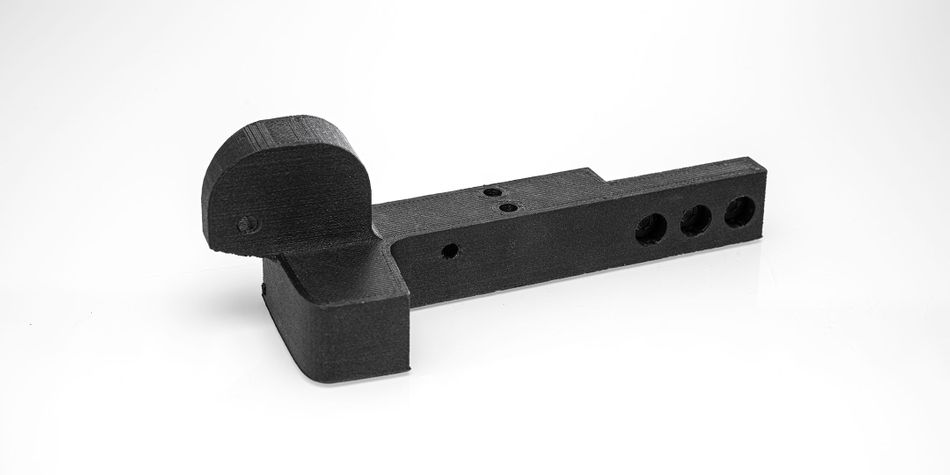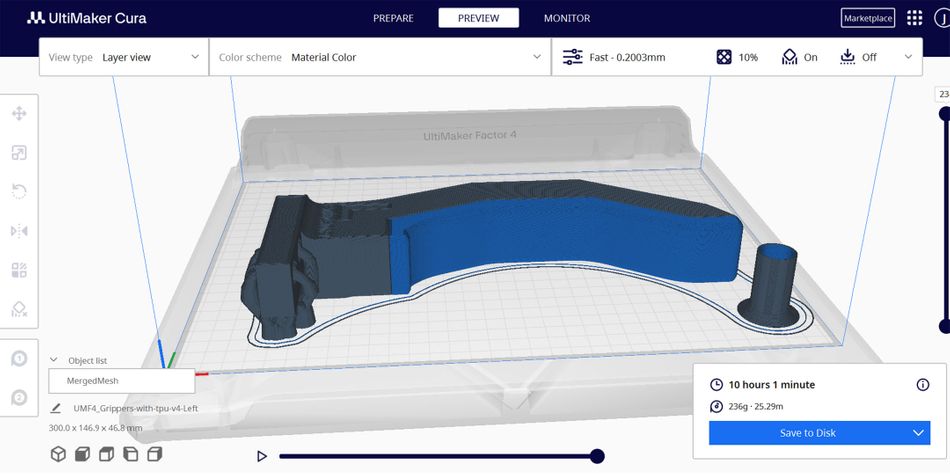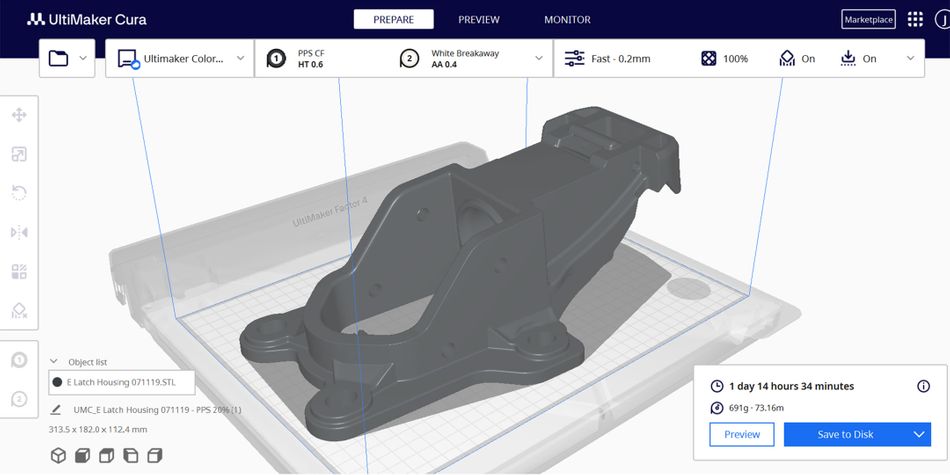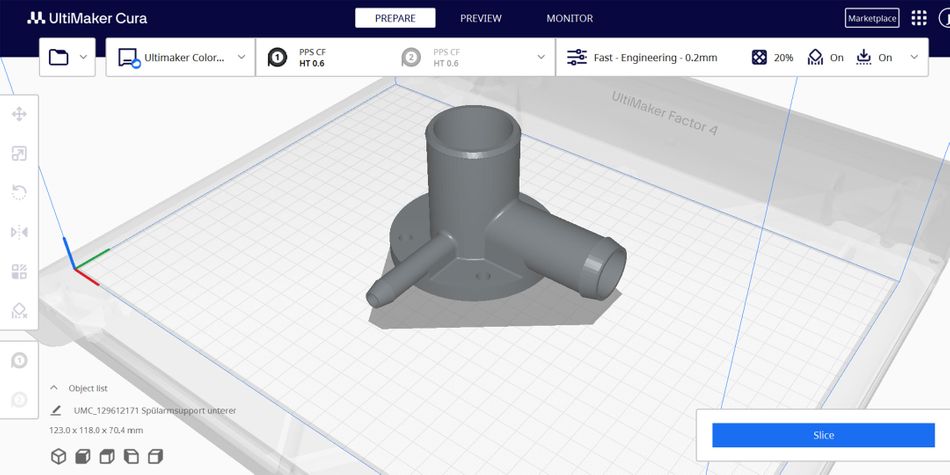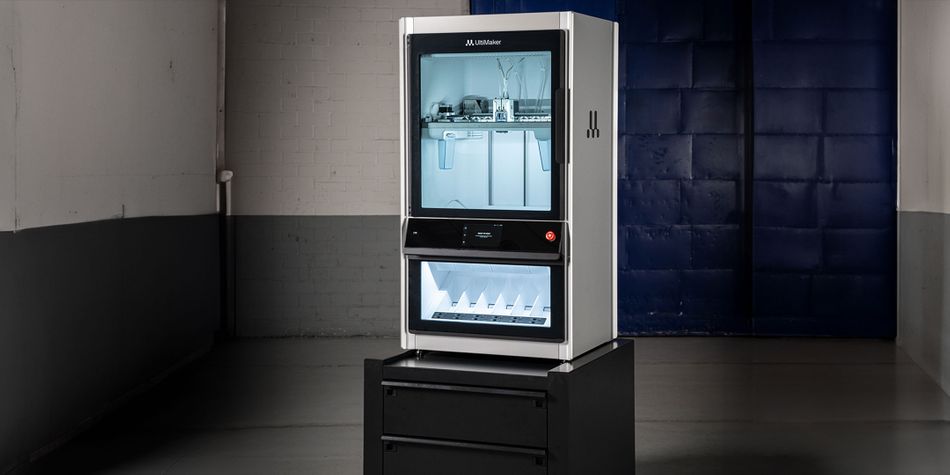The newest Factor 4 material: Industrial 3D printing with PPS CF
With the launch of the UltiMaker Factor 4 came a new 3D printing material: UltiMaker PPS CF.
This article was first published on
ultimaker.comWith the launch of the UltiMaker Factor 4 came a new 3D printing material: UltiMaker PPS CF.
As soon as you pick up a PPS CF part, you notice that this material is different. Give it a tap and its stiffness and density causes it to vibrate like metal. This metallic sound is also caused by the crystalline structure of PPS, where well-defined molecular arrangements contribute to its distinctive acoustic properties.
Beyond this, UltiMaker PPS CF is suitable for precision engineering, with high durability – all while being a cost-effective alternative for high-end metals and PEEK. The newest member of the UltiMaker material portfolio, it brings significant upgrades for various applications across automotive, aerospace, defense, and more.
Let’s take a closer look at the material’s attributes and some examples of real-world PPS CF end-parts that are helping engineers and manufacturers save time and money.
Extreme durability for industrial 3D printing with PPS CF
In the world of industrial production, durability is paramount.
PPS CF (polyphenylene sulfide, reinforced with 10% carbon fiber) is designed to withstand the harshest environments, offering exceptional chemical resistance, heat resistance, and dimensional stability. This high-performance material ensures that your industrial prototypes or functional end-use parts maintain their integrity over time, even under the most demanding conditions.
PPS CF's chemical resistance makes it ideal for applications that are exposed to corrosive substances. Whether it's in the aggressive environments of the chemical processing industry or in automotive components exposed to harsh fluids, PPS CF remains resilient. Its robustness ensures that your parts won't degrade or fail prematurely, providing a reliable material solution that manufacturers can trust.
Dimensional stability is equally important in high-precision manufacturing. PPS CF maintains its shape and size even under significant mechanical stress and temperature fluctuations. This property is vital for ensuring that components fit together perfectly and function as intended. With PPS CF, engineers and designers can achieve consistent, reliable results, reducing the need for frequent recalibration or part replacements.
Now let’s turn to another stand-out feature of PPS CF – its heat resistance.
High-temperature precision with UltiMaker PPS CF
UltiMaker PPS CF opens the door to a new realm of 3D printing applications. Specifically designed for use with the UltiMaker Factor 4 and print core HT, this advanced material provides the precision and reliability that today's industrial demands require. As a semi-crystalline thermoplastic, UltiMaker PPS CF boasts a heat deflection temperature exceeding 230 °C post-printing, making it an exceptional choice for high-temperature applications.
In the field of precision engineering, temperature tolerance is a critical factor. UltiMaker PPS CF's ability to maintain structural integrity at temperatures above 230 °C ensures that your printed parts will perform reliably in demanding thermal environments. This makes it ideal for applications in the automotive and aerospace sectors, where components are routinely subjected to high heat. From engine parts to under-the-hood components, PPS CF delivers the stability and performance needed to meet stringent industry standards.
Chemical resistance is another hallmark of UltiMaker PPS CF. This material is impervious to damage from solvents below 200 °C, making it suitable for use in chemically aggressive environments. Whether used in chemical processing equipment or in parts exposed to harsh cleaning agents, UltiMaker PPS CF maintains its durability and integrity. This chemical resilience translates to longer-lasting parts that require less frequent replacement, enhancing overall efficiency and reducing downtime.
Meeting the UL94 V0 standard for flame retardancy, PPS CF provides an added layer of safety and reliability. Flame retardancy is crucial in applications where fire hazards are a concern, such as in the electronics and transportation industries. PPS CF's compliance with this standard ensures that your parts not only perform well but also contribute to a safer working environment.
UltiMaker PPS CF's compatibility with the Factor 4 and print core HT further expands its utility in precision engineering. This integration allows for highly detailed and accurate parts, reducing the margin for error and ensuring that each component meets exact specifications. For engineers and designers, this means greater confidence in the manufacturing process and the final product.
By integrating UltiMaker PPS CF into your precision engineering projects, you unlock new possibilities in 3D printing. This material's combination of high-temperature resistance, chemical durability, and flame retardancy ensures that your parts are not only precise but also robust and reliable. It's a powerful tool for those who demand the highest standards in their work.
An ideal substitute for parts made of metal or PEEK
UltiMaker PPS CF offers a compelling alternative to traditional materials like steel and aluminum. This means that you can harness the advantages of additive manufacturing, including light-weighting, reduced waste, and complete design freedom, thanks to its compatibility with soluble supports. The result is a versatile, cost-effective solution that doesn't compromise on performance.
Light-weighting is a significant benefit in many industries, particularly automotive and aerospace, where reducing weight can lead to improved fuel efficiency and lower emissions. PPS CF's reinforced structure provides the strength needed for various applications while significantly reducing weight compared to metal counterparts. This makes it an excellent choice for components where every gram counts, enabling manufacturers to achieve their performance goals more efficiently.
Reduced waste is another advantage of using PPS CF in additive manufacturing. Traditional manufacturing methods often involve substantial material waste, especially when machining metal parts. In contrast, 3D printing with PPS CF is an additive process, building parts layer by layer only where material is needed. This not only minimizes waste but also reduces material costs and environmental impact, aligning with sustainable manufacturing practices.
One of the standout features of PPS CF is its compatibility with soluble supports, like UltiMaker PVA. This compatibility enables full design freedom, allowing engineers to create complex geometries and intricate parts that would be challenging or impossible to produce with subtractive processes – opening up new possibilities for innovation and optimization.
PPS CF also presents a viable alternative to PEEK, a high-performance thermoplastic known for its strength and resistance to extreme conditions. While PEEK is highly effective, it can be costly and challenging to 3D print. PPS CF, on the other hand, offers similar benefits in a more cost-effective and user-friendly package. Its ease of printing and reliable performance make it an attractive option for manufacturers looking to balance cost and quality.
Incorporating UltiMaker UltiMaker PPS CF into your production processes allows you to leverage the best of both worlds: the strength and durability traditionally associated with metals and the flexibility and efficiency of additive manufacturing. This material's unique properties ensure that you can produce high-quality, reliable parts without the drawbacks of conventional materials.
For manufacturers and engineers across various industries, UltiMaker PPS CF represents a significant step forward. It provides new opportunities to innovate and optimize production while maintaining cost-effectiveness and reliability.
3 examples of PPS CF 3D printing applications
Transportation grippers
3D printed grippers are popular in the food and packaging industry. Packaging geometries can change frequently, requiring grippers to be quickly adapted – sometimes across the entire production line. These grippers showcase the benefits of dual extrusion, combining flexible TPU and rigid PPS CF. This means the end-of-arm tooling will withstand long-term use, while also protecting the product during transportation. Another huge advantage is that, as the TPU wears down, operators can set a maintenance schedule for when the component needs replacing. This means that the component does not simply break and cause an unexpected disruption in the production line.
Air freight fastener
This holder is used to securely fasten air freight or to safely stow components in the air freight packaging. Accordingly, it must be temperature-resistant, very strong and stable, and resistant to chemicals – application requirements that are all met with PPS CF. Another advantage of additive manufacturing is that the design can be adapted repeatedly, with all iterations meeting the necessary certifications thanks to the material used.
High-pressure pump valve
This pump valve is installed in a train to conduct liquids or chemicals. But because it had become an obsolete component (it was no longer produced), the entire pump assembly would need to be replaced – costing approximately €5,000. Using PPS CF, it can now be 3D printed, so that it still meets the UL94 V0 standard for non-flammability and also for use with hot acids.
How to start 3D printing with UltiMaker PPS CF
3D printing with PPS CF is currently only possible using UltiMaker Factor 4 with the HT print core. If any of these application examples or material properties would be useful to you, click the button below to check out the Factor 4 product page or request a quote here.
